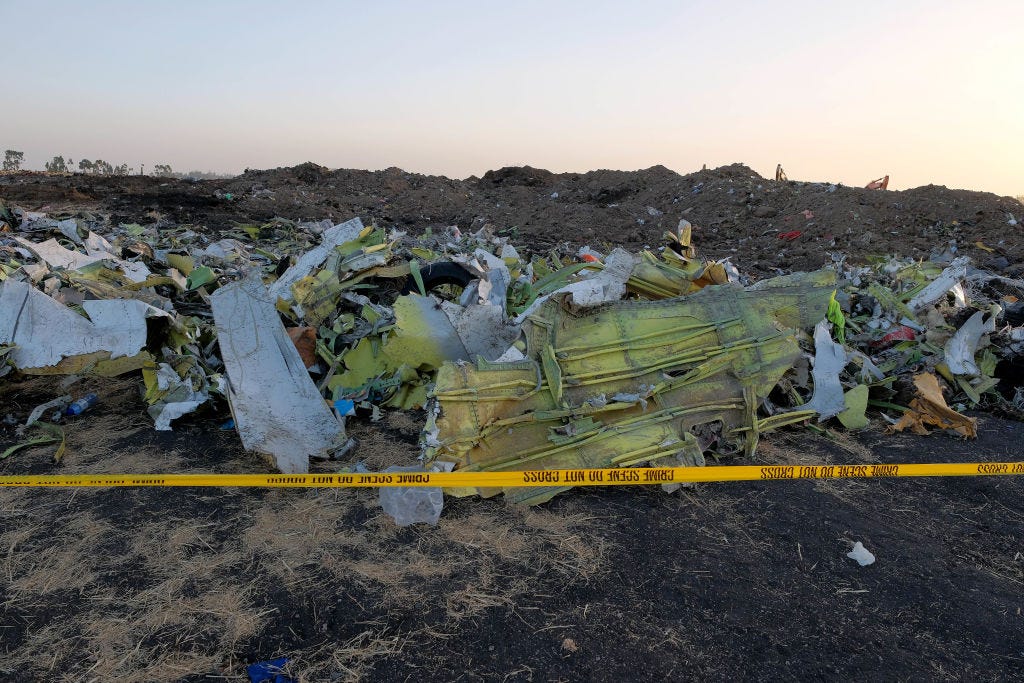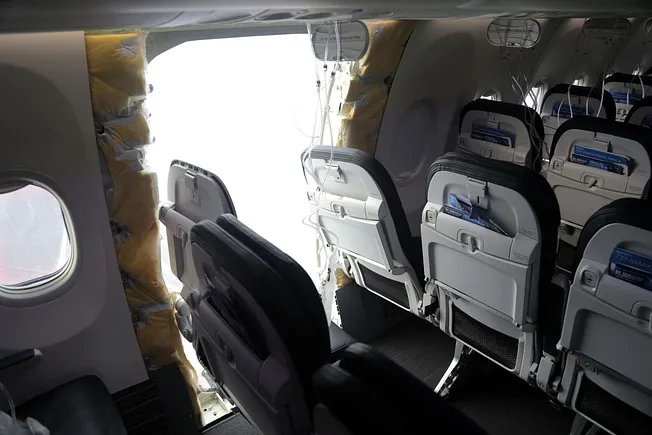In the days before his death, John Barnett was in Charleston, giving a deposition for the whistleblower suit he had filed against Boeing. According to one of his lawyers, Rob Turkewitz, he was upbeat about his testimony, feeling he was finally able to tell the story of his efforts to get the company to take safety more seriously—and the rejection of those efforts by his bosses, who, according to Barnett, simply didn’t want to hear about it.
The last day of the deposition was scheduled for Saturday, March 9. But that morning, he was found in his truck, a bullet in his head and a gun in his hand. The police said it was “a self-inflicted wound.”
The reaction from people who knew Barnett was utter disbelief. On that last day, his lawyers told Time magazine, “he was in very good spirits and really looking forward to putting this phase of his life behind him and moving on. We didn’t see any indication he would take his own life. No one can believe it.” A family friend told ABC News that he had told her, “I ain’t scared, but if anything happens to me, it’s not suicide.”
The internet lit up. It was an “alleged suicide,” or “an apparent suicide.” “Whatever happened to John Barnett, the Boeing whistle-blower who declared he wasn’t suicidal and then died from ‘an apparent suicide?’ ” read one post on X. The clear implication was that Boeing was somehow involved in his death. (In a statement, the company said, “We are saddened by Mr. Barnett’s passing, and our thoughts are with his family and friends.”)
As suspicious as his death was, no one in a position of power is calling for an investigation. And they’re not likely to. But I do know this: everything John Barnett said about Boeing’s problems was true. Everything. If the company had been willing to listen to him, 346 airline passengers would still be alive. And maybe Barnett would be too.
On Monday, two weeks after Barnett’s death, Boeing announced that three top executives, including the CEO and the chairman of the board, were being booted out of the company. Finally, it seems, Boeing was waking up to the fact that its internal culture was destroying its reputation. There were the crashes of the two Boeing 737 MAX planes in 2018 and 2019 that killed 346 people. In January, a door panel flew out of an Alaska Airlines plane made by Boeing, while it was in flight, nearly pulling one of the passengers out with it. Was Barnett’s suicide—if that’s what it was—the last straw?
Perhaps it was. For seven years, from 2010 to 2017, assigned to the company’s South Carolina assembly plant and appalled by the lax controls, Barnett had tried to persuade his managers that the mistakes they were letting slide could one day be fatal. In 2019, Barnett told a journalist at Corporate Crime Reporter that his managers “started pressuring us not to document defects, to work outside the procedures, to allow defective material to be installed without being corrected. . . . They just wanted to push planes out the door and make the cash register ring.”
After he left the company—pushed out, he later alleged—he filed the whistleblower suit that led to that deposition in mid-March. And whenever a Boeing accident took place, he was the media’s whistleblower too, as journalists scrambled to interview him.
“I haven’t seen a plane out of Charleston yet that I’d put my name on saying it’s safe and airworthy,” he told The New York Times in 2019.

What is particularly painful about Boeing’s fall from grace is that it was once the gold standard in American manufacturing. Building an airplane requires great engineers, and that’s what Boeing had. It was a company proudly run by engineers, for engineers—for which it made no apologies. There was no need to impress upon employees the importance of safety because it was part of the engineers’ mindset. The company’s stock price? As Jerry Useem noted a few years ago in The Atlantic, “The company’s chief financial officer had minimal contact with Wall Street and answered colleagues’ requests for basic financial data with a curt ‘Tell them not to worry.’ ”
Then came one of the stupidest moves in the history of corporate America. In May 2001, Boeing’s CEO Phil Condit and its president Harry Stonecipher decided to move the company’s headquarters to Chicago—1,700 miles from its assembly plants in the Seattle area. Condit actually said that the move was made in large part to insulate the top brass from the “day to day business operations.” In other words, Condit and Stonecipher were deliberately divorcing themselves from Boeing’s engineering culture.
What they cared about was the stock. Wall Street no longer had the patience to recommend companies with flat or even slowly rising shares. All that mattered were fast-growing companies with fast-growing stock. In addition to pleasing Wall Street, it also made the top executives very rich because, since the 1980s, so much of their compensation was paid in stock options.
Then, in 2003, Condit was forced to resign after Boeing suffered a series of scandals, the last one being his affair with an underling. His successor Stonecipher was ousted two years later when he, too, was caught having an affair—though not before he proudly proclaimed that he was the reason Boeing was “run like a business rather than a great engineering firm.”
Stonecipher was replaced by James McNerney, a former executive at General Electric, the company that, under Jack Welch, had led the misguided quest to place shareholder wealth above all other corporate values. At least Condit and Stonecipher, who joined Boeing after a merger with McDonnell Douglas, had aviation backgrounds; McNerney had none. By then, as airline expert Mike Boyd told me, “Instead of building airplanes, all they cared about was building the bottom line.”
In 2014, McNerney’s last full year with the company, he pulled down a cool $29 million in compensation. Originally, Boeing was going to build a new airplane from scratch. But seeing that its chief competitor, Airbus, was getting record orders for its new plane, McNerney decided to build the 737 MAX on top of the existing 737 frame—but market it as a new airplane. Boeing was in a huge rush to catch up to Airbus; indeed, by the time it started delivering the plane it had thousands of orders.
“They threw the MAX together at the last minute,” said Boyd. But hey, it would save money—which would increase profits and boost the stock price. The combination of that decision, along with shortcuts Boeing now regularly made that compromised safety, was a terrible mistake.
Then came the two 737 MAX crashes. The first, Lion Air 610, crashed within minutes of its departure from Jakarta, Indonesia, killing 189 people. The second, five months later, Ethiopian Airlines 302, again crashed minutes after takeoff. All 157 people on board died.

After each crash, Boeing apologized profusely, but also insisted that, as then-CEO Dennis Muilenburg told Congress, “Safety is in our DNA.” But everyone could see that it wasn’t. In an effort to get the plane out quickly, Boeing, with the assent of the FAA, had even told the airlines that their pilots didn’t need to conduct flight simulator tests. That was a critical mistake, because the pilots would have discovered the issue that caused the planes to crash. The company was excoriated by Democrats and Republicans alike, furious that Boeing had so blatantly put profits over safety.
Internal Boeing documents made public by Congress showed that the company’s engineers were disgusted by what they were being asked to do in building the 737 MAX. “This airplane is designed by clowns, who in turn are supervised by monkeys,” read one internal email between engineers. A second one read: “I’ll be shocked if the FAA passes this turd.” And a third: “Would you put your family on a MAX simulator trained aircraft? I wouldn’t.” There were also comments about how all the company cared about was cutting costs.
That is what John Barnett was so urgently trying to impress upon his bosses when he was a quality control manager at Boeing: the company was making unsafe planes, and someday people were going to die as a result. And it’s what he tried to tell the rest of us once he became a whistleblower. In addition to all the interviews he gave after the various Boeing mishaps—let’s not forget the wheel that fell off a 777 during a takeoff at San Francisco’s airport earlier this month—his lawsuit was going to expose some critical safety errors at the company the world didn’t yet know about.
Boyd, who is highly critical of the modern Boeing culture, told me that the company has completely lost its way. And the safety issues are only part of the problem. For years, Boeing’s chief competitor, the European company Airbus, lagged behind the American behemoth. Not anymore. “Airbus is ten years ahead of them,” Boyd said. Boeing, he said, has “nothing on the drawing boards. Firing a few executives isn’t going to change Boeing. What they need to do is take a bulldozer to the entire board of directors.”
It is difficult to imagine America without Boeing, the company that pioneered the famously gargantuan 747, which began flying in 1969 and is still considered one of the greatest airplanes ever made. John Barnett is dead. But his mission should be kept alive. If Boeing is to have any chance of becoming great again, it needs to listen to what he had to say.
Joe Nocera is a columnist for The Free Press and the co-author of The Big Fail. Follow him on X @opinion_joe.
Become a Free Press subscriber today:










